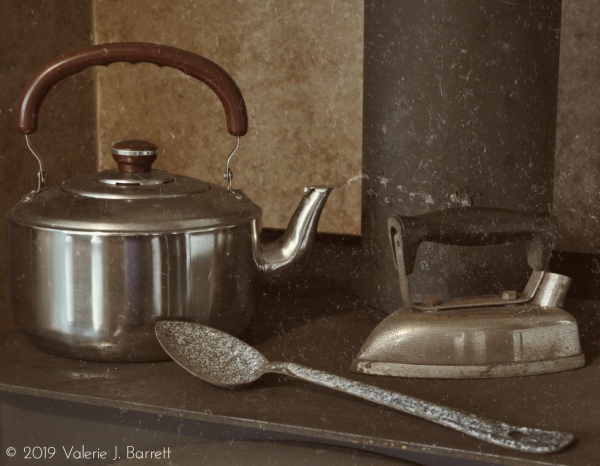Now, let’s get this straight from the start. Some people are described as ‘widely travelled’- I would describe myself as ‘narrowly travelled’. Very narrow. So, when I’m asked to imagine myself somewhere and to describe it, you’re not going to get warm, sandy beaches or sun-kissed, oiled-up lovelies.
You’re going to get something cooler, muddier. Earthier…
My wellies are on, my jeans tucked well into my socks until they bulge.
I scuff up the steps and our wonky garden path, leaving home behind. I pass the coal house- concrete, pitch black inside and filled with spiders’ webs. It would make a good play house, but it’s too cold, too filthy and I don’t like the dark. I pass the cabbages- yellowed and gone to seed. No-one’s touched them since my dad moved out.
I reach the top of the garden, and there it is, the drystone wall that marks the boundary between my world- Firefly paintwork, Tiswas, pork chops for tea- and Barker’s Hill. The hill is wilderness, as wild as the Serengeti as far as I’m concerned. I wedge my toe in a gap between some loose stones, not too far in because the rubber can snag on sharp edges and you get caught up. I swing my leg over the wall, imagine I’m mounting a tall, grey-backed stallion, though I don’t really know what the word ‘stallion’ means, and I don’t like horses anyway. Not if they’re anything like donkeys, because donkeys bite your fingers when you try and feed them carrots.
I swing my other leg over the wall and drop down into a forest of nettles, waist height. This is why I’m in jeans, why they’re tucked so tightly in my socks. I’ve been over here in a skirt before when we first moved in and found that dock leaves don’t help.
I swish a boot around, trying to catch the nettles at their base, pressing them down so they lie flat. I haven’t been over the wall in a few weeks and the prickly gits are lush and green, their tresses waving in the breeze, ready to attack the unprepared. Nettles conquered, a path beaten, I move on.
There’s an arrangement of limestone boulders at the bottom of the hill, where water sometimes gathers. I found a froglet there once, green and speckly, keen to hop even though he hadn’t grown front legs yet. But it’s summer now- too late for froglets.
Further up the slope, there’s an outcrop that local kids use as a den. A natural overhang of grey rock is the roof and three large rocks have been moved under it to make low walls. Maybe it was for a shepherd, or someone watching cows- is that a cowherd? Anyway, it’s probably older than our house and the RAF base and the catering college. I found fossils in the den walls, tiny ammonites, the rubble of a broken seabed that turned to rock. Like looking back millions of years.
But I’m not going to the den today.
I walk round the base of the hill, until the hard, scrubby grass turns squishy and I know I’m almost there. This part of Barker’s is always boggy, always sags and squelches under your boots. Only once have I seen it dry and hard as the limestone, cracked like a dried up river bed. But it’s rained heavily over the last few days and the cows have been through and the mud is churned, pitted with a thousand hoof prints.
I stand on the edge of the thickest mud. It stretches for what seems like forever, to the horizon, or at least the boundary wall. If I get stuck I’m on my own- no big brother to pull me free today. But I so want to visit the Monastery, I convince myself it’s not as bad as it looks. I plunge in but try and stick to the edge, where the mud’s not as deep. Still, I have to stop every so often, shake the heaviest of clumps from my boots, stop my feet from weighing me down.
A few more steps. The light begins to dim as I cross into the shadow of the wood. Trees climb the slope, though young ones, younger than the Monastery- all the trunks are slim enough to wrap my arms round and I know trees get thick as they get older. There are a lot of them, thin grey trunks, though a smoother grey than the mottled limestone. Before I know it, I’m there.
Walls litter the bank, their rubble tumbling into the mud. Not one wall is intact, but I can still make out their lines. I try to work out where the monks slept, where they ate. That section there’s taller, though leaning at such an angle, I wonder for how long. I think of that as the bell tower, calling the monks to prayer. How often do monks pray anyway? I don’t know, but I’m sure it’s lots. I imagine their bent, cowled heads, their hands tucked in their sleeves, the scuff of sandals on limestone flags. Did they really wear sandals- even when frost had crisped the grass? Their feet must’ve gone blue-black- maybe their toes fell off. My toes are cold now in socks and wellies, and it’s summer.
The tree roots have grown round the walls, forking and bending round the blocks. I wonder how something so solid could also be so flexible. Then the sun slips behind the clouds. Leaves rustle, though there’s no wind today.
A shadow darts from one trunk to the next. I stop. Wait to see if there’s another. I feel my boots slide deeper into the mud, past the sole, the toes. It feels as if I’m not sinking, but that the mud is crawling upwards. It’s a frightening thought, and I know that the longer I stay still, the higher the mud will climb. But I can’t move because I’m waiting for another shadow. Or a lack of shadow, or the sun to come out. Waiting for something.
A crack of wings, a chitter and squawk as something black takes to the air and flaps away. I jump, jerk back but can’t move because my ankles are wedged. I flail my arms, nearly fall, then steady myself. I know it was a blackbird- my dad taught me to recognise its croak- but I imagine it a raven disturbed from feeding and if I wait for its return I might be drawn to see what it was eating and suddenly I don’t want to be here.
I try to turn, but my feet move while the boots stay welded to the mud. I try again and again, but the boots won’t come. I keep looking back to the trees, watching for the ravens and the monks. I consider deserting the wellies, leaving them stranded while I wade home in my socks. I imagine my mum’s face when I give her mud-filled socks, tell her about lost wellies. It’s not a happy thought, so I persevere, pointing my toes up so the boots can’t come off. I pull one leg out and it waves in the air as I search in vain for somewhere dry to stand.
Step by sucking step I walk free, back to the drier margins of the bog. On solid ground I move quickly away, listening for a snap of feathers, the ring of a ghostly bell.
I’m sticky-hot and tired by the time I reach the nettle patch. The sun’s back out, baking the scrubby grass, making the clover glow bright pink.
I take one last look at the wilderness before I climb our wall, knowing I can conquer it again tomorrow.







